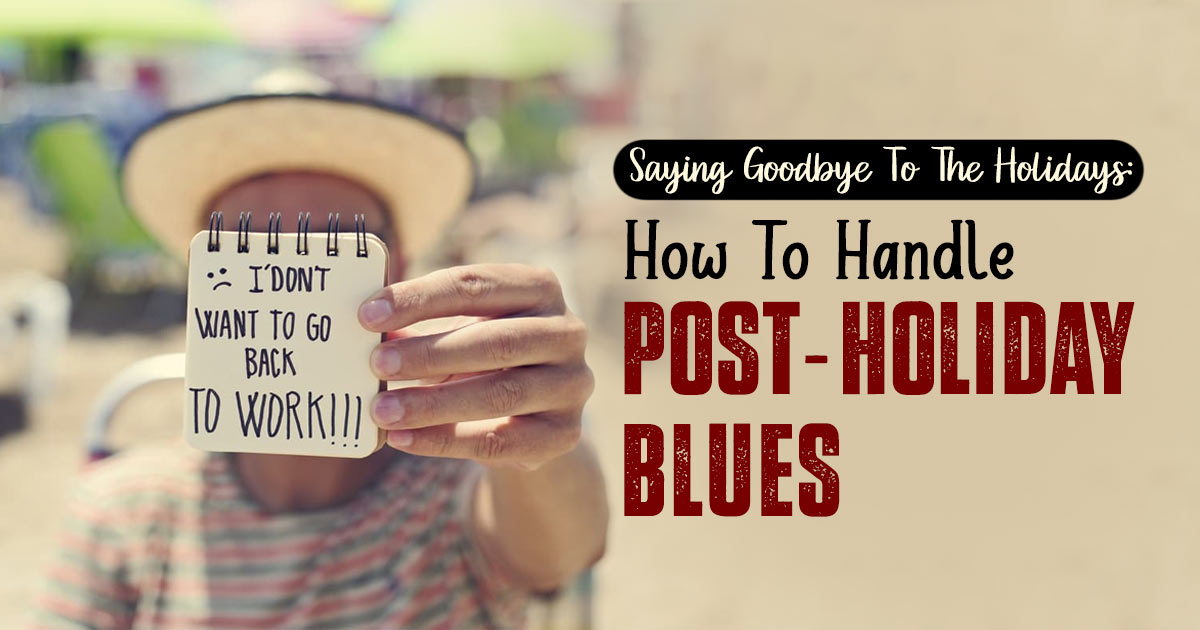The joyous season of holidays often serves as a respite from the hustle and bustle of daily life. However, as the holidays come to an end and the new year begins, many individuals find themselves grappling with a phenomenon known as “post-holiday blues.” These emotions weigh heavily on our mental health, making it all the more necessary for managing post-holiday blues.
Understanding Post-holiday Blues
Post-holiday blues are not uncommon, affecting people to varying degrees. This emotional phenomenon can be attributed to several factors:
1. Contrast Effect:
The stark contrast between the joy and excitement of the holiday season and the return to the mundane aspects of daily life can be a significant trigger for post-holiday blues. The transition from a festive atmosphere to the regular workweek can be jarring.
2. Social Withdrawal:
During the holidays, individuals often spend quality time with friends and family, fostering a sense of togetherness and belonging. Once the holiday season ends, social interactions may decrease, leading to feelings of loneliness and isolation.
3. Unrealistic Expectations:
High expectations for a perfect holiday season can lead to disappointment when reality falls short. Unrealistic hopes can contribute to post-holiday blues as people grapple with unmet expectations.
4. Stress And Fatigue:
Preparing for and participating in holiday activities can be physically and emotionally draining. The abrupt return to a routine filled with work, responsibilities, and chores can exacerbate feelings of exhaustion.
Strategies For Managing Post-Holiday Blues
While post-holiday blues are a common and understandable reaction, they need not be debilitating. With the right strategies, individuals can effectively manage these emotions and make the transition back into daily life more seamless:
1. Set Realistic Expectations:
It’s essential to manage your expectations during the holiday season. Understand that perfection is unattainable, and embrace the beauty of imperfections. Realistic expectations will help reduce the shock of transitioning back to your regular routine.
2. Gradual Transition:
Instead of jumping right back into your daily schedule, consider a gradual transition. Allow yourself some downtime before returning to work, school, or other responsibilities. This can help ease the abrupt shift from a holiday mindset to regular life.
3. Reflect On Positive Moments:
Take time to reflect on the positive moments and cherished memories created during the holiday season. Gratitude can be a powerful tool in countering post-holiday blues. Writing in a journal or discussing these moments with loved ones can be particularly helpful.
4. Stay Connected:
The sense of togetherness and social interactions during the holidays can be a source of joy. Maintain your social connections by scheduling regular meetups or virtual gatherings with family and friends. Social support is a powerful tool for combating loneliness and isolation.
5. Self-Care:
Prioritize self-care during the transition from holidays to everyday life. Engage in activities that promote your physical and mental well-being, such as exercise, meditation, reading, or spending time doing what you love. Caring for yourself will help alleviate stress and anxiety.
6. Set New Goals:
The start of a new year is an ideal time to set fresh goals and aspirations. Establishing clear objectives for the year ahead can provide a sense of purpose and direction, counteracting the aimlessness that post-holiday blues may bring.
7. Plan Mini-Getaways:
Planning small trips or getaways throughout the year can give you something to look forward to. Whether it’s a weekend escape or a day trip, having short breaks on the horizon can help maintain your holiday spirit.
8. Maintain Holiday Traditions:
While holidays may be over, you can continue some of the traditions you enjoyed. Whether it’s a weekly family game night or a monthly potluck with friends, keeping holiday traditions alive in some form can help maintain that sense of togetherness and excitement.
9. Mindfulness And Gratitude Practices:
Incorporate mindfulness and gratitude practices into your daily routine. These practices can help you stay present, appreciate the small joys in life, and reduce feelings of sadness and nostalgia.
10. Professional Help:
If the post-holiday blues persist and become overwhelming, don’t hesitate to seek professional help. A therapist or counselor can provide guidance and support in managing these emotions and any underlying issues.
The post-holiday blues are a common experience for many people as they transition from the festive holiday season to their everyday lives. Understanding the factors that contribute to this phenomenon (such as the contrast effect, social withdrawal, unrealistic expectations, and stress) is the first step in effectively managing post-holiday blues.
By adopting practical strategies like setting realistic expectations, gradual transition, reflection on positive moments, staying connected, self-care, setting new goals, planning mini-getaways, maintaining holiday traditions, practicing mindfulness and gratitude, and seeking professional help when necessary, individuals can navigate the post-holiday blues with grace and resilience.
The goal is not to eliminate these feelings entirely but to acknowledge them and learn how to cope in a healthy and constructive manner. With the right strategies and support systems in place, the transition from the holidays to the everyday can be smoother and more manageable, allowing individuals to find joy and fulfillment throughout the year.


























